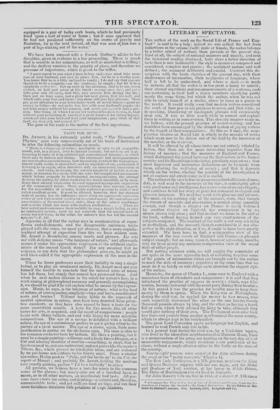TASTE FOR MUSIC.
DR. ARNOTT, in his extremely useful work, " The Elements of Physics," goes very unnecessarily out of his track of instruction to utter the following galimathias on music.
" Music is a knur,wige of nature, intelligible at once to all susceptible minds, and, in a degree, even to inferior animals; but modern art is at- tempting to make of it an artificial and conventional language, in which there may be fashion and change. The ornaments and accompaniments are now so often overwhelming, that the melody, in which the Weiland sen- timent really reside, is ahnost lost ; and an unpracticed car, particularly if listening to an organ, often discovers only an unmeaning succession of chords. And when, in singing, the natural simplicity of melody is aban- doned, in straining to execute with the voice the complicated movements which belong properly to instrumental accompaniments, the attempt destroys the poetry, by either rendering the words inaudible, or by sacri- ficing their natural expression to sonic supposed appropriate expression of the ornamental music. These considerations may account, in part, for the insensibility of so many highly endowed persons to what is now called excellent music. It must be allowed, however, that the changed state of society has its influence; music being an appropriate topre,sMit rather of such hi-II mental excitenwlii existed the contention, a itt vncertainties of the ancient (heel: states, than of the calmer confidence and security which has come with modern civilization.. . . . When we hear noted professors avow their inability to sing a simple ballad, or play an unadorned melody, must we not conclude that the natural sense of music has left them, as the relish for nature's fare has left the morbid epicure."—P. 487.
Agreeing in all that the author says in condemnation of super-
fluous embellishments, and the disagreeable ambitious. tricks played with the voice, we must yet observe, that a more unphilo- sophical attempt at exposition than this we have seldom seen. Dr. Arnott is floundering among words and phrases, lie sets out with defining music "the language of nature," and afterwards argues it under the appropriate expression of the artificial excite- ments of the ancient Greek states ! For any meaning that he conveys, or any data that the philosopher goes on, he might as well have called it the appropriate expression of the man in the moon.
When he hears professors avow their inability to sing a single
ballad, or to play an unadorned melody, Dr. Arnott need not give himself the trouble to conclude that the natural sense of music has left them, but simply that conceit has possessed them. And when he next makes allusion to the relish for nature's fare, in a work aiming at philosophical accuracy and generally accomplishing it, we should be glad if he will explain what he means by the expres- sion. Music, he says, is the language of nature; what is the food of nature, of corresponding simplicity—hips and haws, uncultivated roots and berries ? Without being liable to the reproach of morbid epicurism in eating, men have long deserted these pr- tive esculents,. as they have also ceased to have a taste for the more unartificial sounds. A taste for fine music, like all other tastes for arts, is acquired, and the result of comparisons ; people begin with liking ballads, and end with liking the more scientific compositions. The eye of a savage is delighted with a brilliant colour, the eye of a connoisseur prefers to see it giving effect to the picture of a great master. The eye of a clown, again, finds more gratification in gazing on the ale-house sign. His taste is akin to the common exclusive taste for ballads. He likes a painting, but it must be a simple painting—a George and a lively Green Dragon, or a Cat and alluring shoulder of mutton—something, in short, that he has been used to, and can understand, and not pieces like the squire's Titians, &c., which present no intelligible ideas, and are endeared by no pot-house associations to his thirsty mind. From a similar ignorance, Hodge prefers "Polly, put the kettle on" to the Vol elle sapete of Mozart ; and probably Dr. Arnott, holding the medium (not exactly golden), prefers " I'd be a butterfly" to either.
All persons, we believe, have a taste for music in the common sense of the phrase; but ninety-nine out of a hundred have, in music, as in all other matters, an inordinately bad taste. All per- sons have a taste for eating and drinking—a natural and, therefore, commendable taste ; and yet millions feast on tripe, and vex their
more fastidious intestines with potations of Cape Madeira,


















 Previous page
Previous page